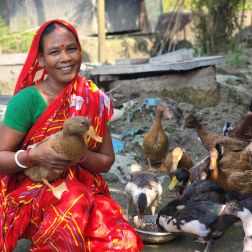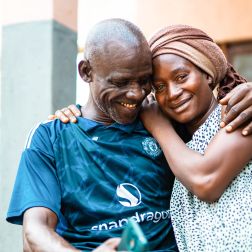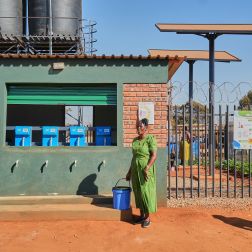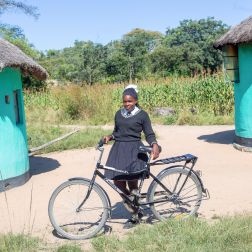- 5 mins read time
- Published: 4th March 2021
Say Enough: Why dismantling patriarchal norms is more important than ever this International Women's Day
By Victoria Stetsko, Rebecca Shadwick and Alejandra Aguilar of Oxfam’s Enough! campaign
5 March 2021
The Covid-19 pandemic has been called “the great equalizer”.
However, the past 12 months made it clear that the most excluded, oppressed, and vulnerable groups, such as girls and women in all their diversity, have been disproportionately affected by its impact. How can we build a more equal and resilient world? As we prepare to mark International Women’s Day this Monday, 8 March, here are some lessons the Enough team has learnt from four years of campaigning on social norm change to end gender-based violence. Spoiler alert: we need to dismantle patriarchal norms.
We’ve had many opportunities to listen to feminist activists from over 30 countries while co-creating and implementing the Enough! campaign together. For over four years, we’ve been working to mobilise alongside young people who want to live in societies free from gender-based violence (GBV), to support them to take bold steps against the patriarchal norms that underpin such violence. The new reality induced by the pandemic demonstrates the relevance of this collaboration.
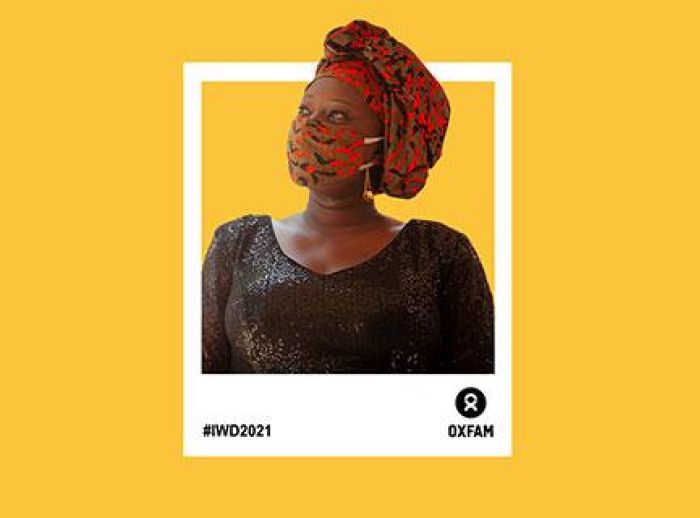
The gendered effects of the pandemic were immediately evident. Reports of GBV surged in many countries which introduced lockdowns. Worldwide, women were the first to lose their jobs, shoulder the increased responsibilities of unpaid care work, and encounter restricted access to sexual and reproductive health services.
Those facing discrimination due to their age, race, ethnicity, gender, sexuality, health conditions and migration status prior to the pandemic saw the risks and impact of social and economic exclusion multiplied.
While the adverse effect on girls and women is alarming, the often-total lack of consideration for their vulnerabilities in most countries’ Covid-responses is shocking. According to UNDP’s Covid-19 Gender Response Tracker, less than 15 percent of countries introduced measures to tackle violence against women and girls and to support women who faced economic insecurity. But women are finding other ways of making themselves heard. In 2020, we saw a surge in feminist protests for access to safe abortions, livelihoods, political participation and ending police brutality in Poland, Turkey, Nigeria, Argentina and India. When patriarchy deprives women of their voices, they rise.
Listening to feminist activists and amplifying their voices have been at the core of the Enough campaign. Here are just some of the lessons we’ve learnt through this global collaboration:
Making the invisible visible
The World Health Organisation asks countries to collect the gender-disaggregated data on the effects of Covid-19 on men and women, because data makes the invisible visible. Similarly, we’ve been exploring how social belief systems affect the prevalence of GBV. The results of the research we led in 12 Latin American countries highlight eight key patriarchal norms which contribute to the region’s high GBV rates. In Russia, Bolivia and the Philippines, campaigners documented social experiments which test norms and attitudes towards survivors of violence. Data helps expose the systemic nature of social problems and offers pathways to solutions. That’s why even after the lockdowns hit, we continued to collect it.
Nothing about us without us
The national chapters of the Enough! campaign have been co-created and co-led by women and young people. “Evoluciona” campaign in Cuba partnered with the National Federation of Cuban Women, and “ACTÚA Detén la violencia” in Bolivia was co-designed by 15 local youth organisations. Creating spaces for the leadership of youth and feminist organisations fosters ownership and authenticity of the campaign and allows them to decide on the methods for delivering key messages and addressing the identified patriarchal norm change. In Bolivia, the campaign featured meme competitions and campaigning bootcamps; in China, feminist skits – and in Russia, social media marathons.
The power of storytelling
The stories we tell shape our society and how it functions. From its inception, the Enough! campaign included artists in its design and roll-out for this reason. Street art, poetry, cinema, dance, theatre, illustration, and music help us imagine the future without patriarchy and the violence it sustains and thrives in. During the 16 Days of Activism Against Gender-Based Violence in 2019, the “Say Enough Cypher” brought together poets, spoken word artists and musicians to speak out against the widespread social tolerance of GBV. Last year, the pandemic prompted us to celebrate feminist resilience and solidarity through recipes to #LockdownPatriarchy.
In Oxfam’s Global Strategy for 2020-2030, it names patriarchy as one of the systems of oppression we must dismantle to eliminate extreme inequality. As the pandemic continues to reveal, patriarchy is not an issue that only feminists have to deal with – it must be tackled by everyone. We wanted to share the incredible work and lessons we've learned, in the hopes that others will use it to say Enough to GBV. We've compiled what we've learned into a progress report, which is available here. For more updates, follow @SayEnoughCampaign and @Oxfam on social.
